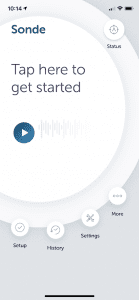March 4, 2021
Sonde Health and the Xavier University Center for Population Health have teamed up to study the effectiveness of Sonde’s vocal biomarker platform as a screening tool for symptoms of COVID-19 and its ability to provide an early warning system at schools, workplaces, sporting events, and other places where large groups of people gather.
The study will rely on Sonde One, a research-based smartphone app, which quickly and objectively detects signs of respiratory symptoms such as chest pain, coughing, or shortness of breath through a six-second voice sample.
The goal of the new study is to validate the vocal biomarker platform’s effectiveness as a daily screening tool, such that it could be used to augment Xavier’s campus-wide contact tracing program.
Sonde Health CEO DAVID Liu said, “We’ve long known that the voice is a meaningful predictor of an individual’s health. Our collaboration and research with Xavier University examine whether we can scale that insight to protect public health during the pandemic.”
The study will observe 125 volunteers that have been asked to quarantine as part of the university’s CDC-informed contact tracing program. Each participant will record their voice daily while in quarantine. Those identified by the application as showing respiratory symptoms with one or more COVID-associated symptoms will be immediately tested for COVID-19. All participants will be tested at the conclusion of the quarantine period.
“This is a great opportunity to evaluate population health tools and strategies to benefit the larger community through scientific rigor – in effect putting our mission into practice,” said Dr. Victor Ronis-Tobin, interim director of the Xavier University Center for Population Health, and principal investigator for this research. “This study will also help ensure that Xavier University is working to develop the best methods for providing the safest learning environment possible for our students, faculty, and staff.”
Since reopening its campus in August 2020 to one of its largest incoming freshmen classes ever, Xavier University has seen remarkable success in containing COVID-19 infections through a mix of initiatives, including surveillance testing, hybrid-online learning models, contact tracing, and dedicated housing for isolation and quarantine where needed. The student body has also been credited with near-universal mask usage.
“Healthy, college-aged students are likely to be among the last people to be vaccinated, so it’s important to continue looking for ways to enhance the protections for this group,” Dr. Ronis-Tobin said. “If we can use Sonde’s vocal biomarker platform to contain the spread in a university setting, there are clear applications in workplaces, healthcare settings, and anywhere else that large groups congregate.”
Parallel clinical trials are also underway at various U.S. and international hospitals to validate the vocal biomarkers in COVID-19 patients.
Sonde’s vocal biomarker technology leverages a machine learning model trained on more than 1 million voice samples from more than 80,000 people to identify subtle changes in physiology that may be indicative of various medical conditions. With a six-second voice sample, the platform detects with more than 70% accuracy features in the voice that are known to correspond to symptoms such as coughing, shortness of breath, and chest tightness or pain, which are found in several respiratory diseases.
Because Sonde’s health check only takes a few seconds to administer and results are delivered in real-time over most mobile devices, scaled daily screening of large populations can be achieved to reduce the spread of respiratory illnesses, such as COVID-19 or influenza.
